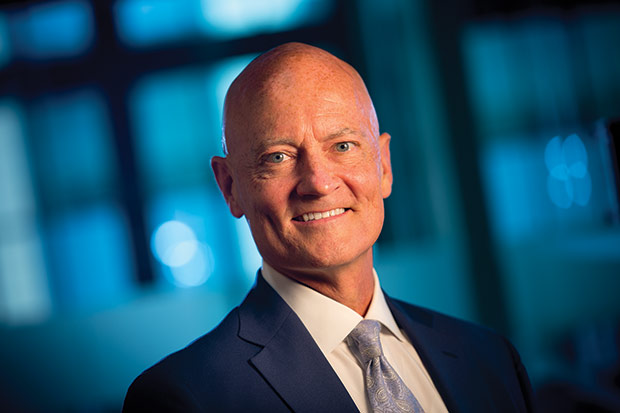Bobber helps clients through employment-law maze
By: MaryBeth Matzek, Special to the Wisconsin Law Journal//August 9, 2017//
Bobber helps clients through employment-law maze
By: MaryBeth Matzek, Special to the Wisconsin Law Journal//August 9, 2017//

Bernard “Bud” Bobber finds fulfillment guiding clients through the labyrinth of employment laws and regulations.
“Helping clients solve their problems within a legal framework is rewarding” said Bobber, a shareholder in the Milwaukee office of Ogletree Deakins. “I enjoy working on the real-life problems of people and not some nameless, faceless corporation.”
Bobber’s practice splits evenly between work on standard labor-union relationships and employment litigation. On the litigation front, he has worked on many class-action suits, including some involving wage and hour rules and benefit claims made under the Employee Retirement Income Security Act.
“One lively area now is retired employees and their healthcare coverage,” Bobber said. “Companies have changed coverages as a way to save on costs and some retired employees see the deals agreed to years ago as non-negotiable, so they see any change as breaking a promise.”
The two sides of Bobber’s practice also provide him with a variety of experiences ranging from National Labor Relations Board hearings to federal court hearings.
“That variety is good,” he said.
NLRB hearings and arbitration cases give Bobber an opportunity to put his litigation abilities to use – something he relishes.
“Being able to get up there and skillfully cross-examine a witness – or even the adversary –gives you that courtroom-like experience that you may not always get with litigation cases since so many settle before going to trial,” he said. “Being able to prepare a case, present it and then wrap it up is a nice part of the practice.”
Wisconsin Law Journal: What do you do outside of work to deal with stress from the office?
Bud Bobber: I have three stress busters that I rely on: Exercise, play guitar or call my parents. With exercise, I do it to the point of physical exhaustion. I used to run mainly, but lately I prefer to work out at home following a high-intensity program on DVDs. A very excited (and ripped) guy shows me some crazy moves to perform in rapid succession as he continuously screams at me “Don’t give up!” With guitars, I currently own eight of them (and counting), so choosing which to use is the tough part. Playing guitar is one of those things you can really enjoy even if you’re mediocre. I also call my mom or dad for a chat on my drive home from work. (That’s usually better than listening to the news of the day on the way home, which tends to compound stress these days.)
WLJ: What’s one thing that many people get wrong about what you do?
Bobber: Too many people seem to assume that representing employers means assisting them in efforts to undermine or even cheat the interests of employees or other individuals. Not true. We management-side lawyers mainly help employers comply with the law. Moreover, in counseling an employer, I include “what’s the right thing to do” with my feedback about “what’s legal.” I serve up strategic compliance advice, but with a side of conscience.
WLJ: What is your favorite memory from law school?
Bobber: I had a terrific experience that showed me firsthand how lawyers make society better. As a second-year student, I worked at the Northwestern University School of Law Legal Clinic. We represented an African American first-year law student in a public-accommodations claim against a local night club in Chicago on Rush Street. During new student orientation week, our client went to the night club with several of his brand new classmates as he tried to socialize and form new friendships. The bouncer denied him entrance, claiming that his collarless (designer) t-shirt violated the club’s dress code. However, the other students in the group, all of whom were Caucasian, were admitted even though some of them also wore collarless shirts. Our client was humiliated in front of his new colleagues and was very shaken by what he sensed was discriminatory treatment. He brought his story to the legal clinic.
At the clinic, we decided to test whether this particular club was screening out patrons based on race – a practice that had been rumored because the nightclubs in that area (Rush and Division streets) were located very near housing projects with high-crime areas and the rumor was that they were screening out blacks to keep the nightlife scene there more appealing to the suburban (white) folks. I served as one of our test subjects. The very next Saturday night after our client’s incident, I approached the club wearing the clothes our client wore the week before when he was denied entrance. The doormen welcomed me and admitted me without a question. I went in, documented the circumstances and became a lead witness in our client’s race-discrimination claim against the club. The case settled early on and our client received a written apology and a cash settlement.
WLJ: Is there a certain case that stands out to you?
Bobber: I had the privilege to be lead defense counsel in a putative class-action case in Wisconsin against a gigantic retailer. The case involved a variety of wage claims asserted under Wisconsin law on behalf of current and former employees who claimed that they were not paid for a variety of required work duties that they performed “off-the-clock.” Plaintiffs sought back pay, liquidated damages and attorneys’ fees. This case was one of numerous such claims that were filed by a network of plaintiffs’ firms against this retailer in dozens of states across the country. In some states, the plaintiffs prevailed, obtaining verdicts against the retailers in the tens of millions of dollars. The putative class in the Wisconsin case I defended numbered more than 100,000 members, making it, as best we could determine, the largest putative employment class action case ever in our state. The class certification issue was huge for our client, to say the least. Class certification was a challenging issue in part because, unlike the more comprehensive Federal Rule 23 governing class certification and the plethora of federal case law implementing FRCP 23, Wisconsin’s class-certification procedure consisted of one sentence (in Section 803.08(1)), and a fairly limited body of law applying that one sentence. There was much left to be developed.
Our team convinced a Milwaukee County Circuit Court Judge to deny class certification (which had been granted in cases in other states on virtually identical claims). The case was rotated to a new judge, and the plaintiffs amended their complaint and sought class certification on narrower claims. A second Circuit Court judge denied certification, and plaintiffs appealed. The Court of Appeals affirmed that denial in a 2006 decision authored by the late Judge Ralph Adam Fine. The Supreme Court later denied plaintiffs’ petition for review. Our team obtained a great result for our client and made a significant contribution to the development of the class-action jurisprudence in Wisconsin.
Legal News
- Wisconsin joins Feds, dozens of states to hold airlines accountable for bad behavior
- Trump ahead of Biden in new Marquette poll
- Bankruptcy court approves Milwaukee Marriott Downtown ‘business as usual’ motion
- New Crime Gun Intelligence Center to launch in Chicago
- Arrest warrant proposed for Minocqua Brewing owner who filed Lawsuit against Town of Minocqua
- Wisconsin Supreme Court justices question how much power Legislature should have
- Reinhart named the 2024 Wisconsin law firm of the year by benchmark litigation
- Milwaukee’s Common Council now has the most African Americans, women and openly LGBTQ members ever
- Office of School Safety Provides Behavioral and Threat Assessment Management Training Ahead of 25th Anniversary of Columbine Shooting
- Wisconsin Supreme Court to hear arguments in Democratic governor’s suit against GOP-led Legislature
- Lawsuit asks Wisconsin Supreme Court to strike down governor’s 400-year veto
- Wisconsin man pleads not guilty to neglect in disappearance of boy
WLJ People
- Power 30 Personal Injury Attorneys – Russell Nicolet
- Power 30 Personal Injury Attorneys – Benjamin Nicolet
- Power 30 Personal Injury Attorneys – Dustin T. Woehl
- Power 30 Personal Injury Attorneys – Katherine Metzger
- Power 30 Personal Injury Attorneys – Joseph Ryan
- Power 30 Personal Injury Attorneys – James M. Ryan
- Power 30 Personal Injury Attorneys – Dana Wachs
- Power 30 Personal Injury Attorneys – Mark L. Thomsen
- Power 30 Personal Injury Attorneys – Matthew Lein
- Power 30 Personal Injury Attorneys – Jeffrey A. Pitman
- Power 30 Personal Injury Attorneys – William Pemberton
- Power 30 Personal Injury Attorneys – Howard S. Sicula











